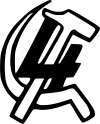Lutte Ouvrière is a Trotskyist communist party in France, named after its weekly paper. Arlette Laguiller has been the party's spokeswoman since 1973 and ran in each presidential election until 2012, when Nathalie Arthaud was the candidate. Robert Barcia (Hardy) was its founder and central leader. Lutte Ouvrière is a member of the Internationalist Communist Union. It emphasises workplace activity and has been critical of such recent phenomena as alter-globalization.
The Revolutionary Communist League was a Trotskyist political party in France. It was the French section of the Fourth International (Post-Reunification). It published the weekly newspaper Rouge and the journal Critique communiste. Established in 1974, it became the leading party of the far-left in the 2000s. It officially abolished itself on 5 February 2009 to merge with smaller factions of the far-left and form a New Anticapitalist Party.
The Internationalist Communist Union is an international grouping of Trotskyist political parties, centred on Lutte Ouvrière in France.

Daniel Gluckstein is a French Trotskyist politician best known for running in the French presidential election of 2002 as the candidate of the Workers' Party.

Alain Krivine was a French Trotskyist leader.
Raymond Molinier (1904–1994) was a leader of the Trotskyist movement in France and a pioneer of the Fourth International.

Pierre Broué was a French historian and Trotskyist revolutionary militant whose work covers the history of the Bolshevik Party, the Spanish Revolution and biographies of Leon Trotsky.
Yvan Craipeau was a French Trotskyist activist.
Francois de Massot is a political activist, writer, and journalist. He is the son of the Surrealist writer Pierre de Massot and an associate of Francis Picabia and André Breton. Massot is of French-Scottish extraction and fluent in English. He has worked as a translator, including in the film industry.

The Union of Communist Students is a French student political organization, part of the Mouvement Jeunes Communistes de France. It was founded in 1939 but dissolved after World War II. The UEC was re-created in 1956, along with the MJCF. It is independent from the French Communist Party (PCF) although it remains close to it. It maintains exchange contacts with the PCF, in particular on student issues. The UEC is organized in sectors, by university, and is led by a national collective elected during the congress of the MJCF and renewed during the National Assemblies of the facilitators, every year. A national coordination runs the organization.

Olivier Christophe Besancenot is a French left-wing political figure and trade unionist, and the founding main spokesperson of the New Anticapitalist Party from 2009 to 2011.
Rodolphe (Rudi) Prager was a French militant Trotskyist politician and publicist.
The Internationalist Workers Party was a French Trotskyist party established in 1936 after the exclusion of militant Trotskyists from the French Section of the Workers' International in 1935 and dissolved in 1939 when most of the militants had rejoined the Workers and Peasants' Socialist Party. It was an official section of the Fourth International.
The Internationalist Communist Organisation was a Trotskyist political party in France. Its successor was the Internationalist Communist Current of the Workers Party.

Pierre Frank was a French Trotskyist leader. He served on the secretariat of the Fourth International from 1948 to 1979.

Pierre Lambert was a French Trotskyist leader, who for many years acted as the central leader of the French Courant Communiste Internationaliste (CCI) which founded the Parti des Travailleurs.
The Revolutionary Socialist Party, abbreviated to RSP, was a far-left party in Luxembourg. At its start, it was a Trotskiyst group active in the late sixties in the General Association of Luxembourgish Students. When the majority of students' group became Maoist and was transformed in the Revolutionary Socialist Left, the Trotskyist minority split and founded the Revolutionary Communist League in September 1970. It published Klassenkampf starting in 1970, and in December 1984 was renamed the Revolutionary Socialist Party and published Sozialistesch Aktioun until 1992.

The Revolutionary Communist Party of France is an anti-revisionist Marxist-Leninist communist party founded in 2016. It was the result of a merger of Intervention Communiste and the Union Révolutionaire Communistes de France (URCF).

Michel Lequenne was a French politician and activist. He was particularly interested in Christopher Columbus and the Russian Revolution.

La Vérité is the first trotskyst publication of History, having its first issue published on August 15, 1929, in French. Its name refers to Pravda, which means Truth, and was chosen because Trotskyists believed that the French labor movement needed "Truth therapy".










